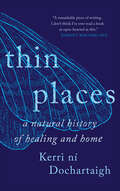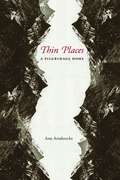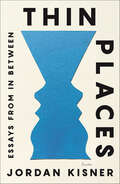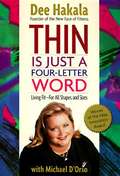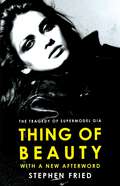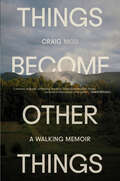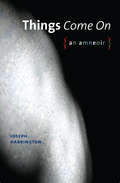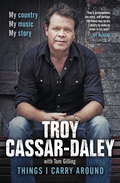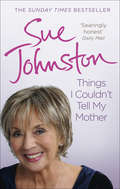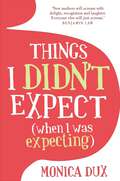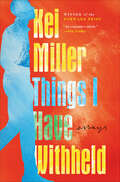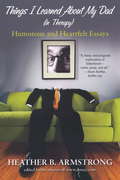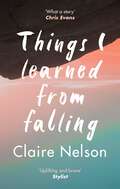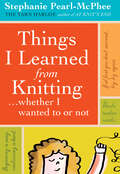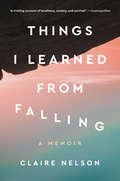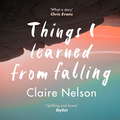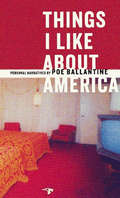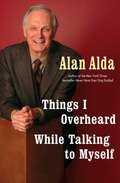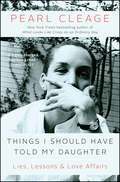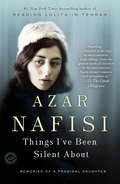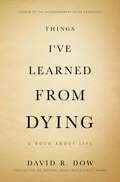- Table View
- List View
Thin Is the New Happy: A Memoir
by Valerie FrankelFrom Valerie Frankel, author of the hilarious memoir IT'S HARD NOT TO HATE YOU, comes a hilarious, unflinching, self-deprecating, and joy-filled memoir that will appeal to every women, everywhere.You've heard the phrase "the mirror is not your friend." For Valerie Frankel, the mirror was so much more than "not a friend." It was the mean girl who stole her lunch money, bitch-slapped her in the ladies' room, and cut the hair off her Barbie. Like most women, Valerie spent most of her conscious life on a diet, thinking about a diet, ignoring a diet, or failing on a diet. At age eleven, her mother put Val on her first weight-loss program. As a teen, she was enrolled in Weight Watchers (for which she invented creative ditching methods). As a young woman, her world felt right only when she was able to zip a certain pair of jeans. Not wanting to pass this legacy on to her own daughters, Valerie set out to cleanse herself of her obsession. Thin Is the New Happy is the true story of one woman's quest to exorcise her bad body-image demons, to uncover the truths behind what put them there, and to learn how to truly love herself. This ebook edition includes two bonus essays from the new memoir It's Hard Not to Hate You.
Thin Places: A Natural History of Healing and Home
by Kerri ní DochartaighAn Indie Next Selection for April 2022An Indies Introduce Selection for Winter/Spring 2022A Junior Library Guild SelectionBoth a celebration of the natural world and a memoir of one family’s experience during the Troubles, Thin Places is a gorgeous braid of “two strands, one wondrous and elemental, the other violent and unsettling, sustained by vividly descriptive prose” (The Guardian). Kerri ní Dochartaigh was born in Derry, on the border of the North and South of Ireland, at the very height of the Troubles. She was brought up on a council estate on the wrong side of town—although for her family, and many others, there was no right side. One parent was Catholic, the other was Protestant. In the space of one year, they were forced out of two homes. When she was eleven, a homemade bomb was thrown through her bedroom window. Terror was in the very fabric of the city, and for families like ní Dochartaigh’s, the ones who fell between the cracks of identity, it seemed there was no escape. In Thin Places, a luminous blend of memoir, history, and nature writing, ní Dochartaigh explores how nature kept her sane and helped her heal, how violence and poverty are never more than a stone’s throw from beauty and hope, and how we are, once again, allowing our borders to become hard and terror to creep back in. Ní Dochartaigh asks us to reclaim our landscape through language and study, and remember that the land we fight over is much more than lines on a map. It will always be ours, but—at the same time—it never really was.
Thin Places: A Pilgrimage Home
by Ann ArmbrechtThin Places is an eloquent meditation on what it means to move between cultures and how one might finally come home, a particular paradox in a culture that lacks deep ties to the natural world. During the 1990s, Ann Armbrecht, an American anthropologist, made several trips to northeastern Nepal to research how the Yamphu Rai acquired, farmed, and held onto their land; how they perceived their area's recent designation as a national park and conservation area; and whether-as she believed-they held a wisdom about living on the earth that the industrialized West had forgotten. What Armbrecht found instead were men and women who shared her restlessness, people also driven by the feeling that there must be more to life than they could find in their village. "We each blamed our dissatisfaction on something in the world," she writes, "not something in ourselves or in the stories we told ourselves about that world. If only we lived elsewhere, then we would be at home." Charting Armbrecht's travels in the mountains of Nepal and in the United States and her disintegrating marriage back home, Thin Places is ultimately an exploration not of the sacred far-off but of the sacredness of places that are between-between the internal and external landscape, the self and others, and the self and the land. She finds that home is not a place where we arrive but a way of being in place, wherever that place may be. Along the way, Armbrecht explores the disconnections in our most intimate relationships, how they stem from the same disconnections that create our destruction of the land, and how one cannot be healed without attending to the other.
Thin Places: Essays from In Between
by Jordan KisnerIn this provocative essay collection, an award-winning writer shares her personal and reportorial investigation into America’s search for meaning.A Los Angeles Times BestsellerA Lit Hub | Chicago Review | Ms. Magazine March PickA Lambda Literary Most Anticipated BookWhen Jordan Kisner was a child, she was saved by Jesus Christ at summer camp, much to the confusion of her nonreligious family. She was, she writes, “just naturally reverent,” a fact that didn’t change when she—much to her own confusion—lost her faith as a teenager. Not sure why her religious conviction had come or where it had gone, she did what anyone would do: “You go about the great American work of assigning yourself to other gods: yoga, talk radio, neoatheism, CrossFit, cleanses, football, the academy, the American Dream, Beyoncé.”A curiosity about the subtle systems guiding contemporary life pervades Kisner’s work. Her celebrated essay “Thin Places” (Best American Essays 2016), about an experimental neurosurgery developed to treat severe obsessive-compulsive disorder, asks how putting the neural touchpoint of the soul on a pacemaker may collide science and psychology with philosophical questions about illness, the limits of the self, and spiritual transformation. How should she understand the appearance of her own obsessive-compulsive disorder at the very age she lost her faith?Intellectually curious and emotionally engaging, the essays in Thin Places manage to be both intimate and expansive, illuminating an unusual facet of American life, as well as how it reverberates with the author’s past and present preoccupations.“An unsettling and an endlessly curious read.” —Sarah Neilson, Electric Literature
Thin is Just a Four-letter Word: Living Fit - for All Shapes and Sizes
by Michael D'Orso Dee HakalaDee Hakala has lost 100 pounds & 36 --& kept them off; she's dropped 5 dress sizes; & her health problems have disappeared. And, she's launched a revolutionary fitness program combining exercise, behavior modification, & group support that's designed for people who are overweight or inactive. Her book is for those thousands who have felt left behind by the diet-&-fitness industry. This is Dee's own story that explains how she pulled herself out of despair & compulsive eating & began to change, step-by-step. Shows you how to start feeling happy & energized from the moment you start moving, without expensive equipment or a gym membership.
Thing of Beauty
by Stephen FriedThe inspiration behind the Emmy Award–winning HBO film Gia with Angelina Jolie, this &“vivid…exhaustive&” (The New York Times Book Review) account of the iconic and tragic life, career, and legacy of supermodel Gia Carangi features a new afterword by the author. At seventeen, Gia Carangi was working the counter at her father&’s Philadelphia luncheonette. Within a year, she was one of the world&’s top models, gracing the covers of Cosmopolitan and Vogue, partying at Studio 54, and redefining the fashion industry&’s standard of beauty. But behind the glitz and fame, Gia was a young woman in pain, desperate for her mother&’s approval and facing a drug addiction that quickly spun out of control. With dizzying speed, she went from $10,000-a-day fashion shoots to using drugs on the streets of New York and Atlantic City before finally being blackballed from modeling. At twenty-six, Gia once again made history as one of the first famous women to die of AIDS. This &“chilling tale&” (The Boston Globe), based on hundreds of interviews with friends, family, lovers, and fashionistas (the term author Stephen Fried coined for her industry colleagues), is comprehensively explored in this unputdownable biography that will introduce Gia to a new generation. It is also a powerful exploration of our society&’s views of beauty and sexuality, fame and objectification, mothers and daughters, love and death.
Things Become Other Things: A Walking Memoir
by Craig ModA transformative 300-mile walk along Japan&’s ancient pilgrimage routes and through depopulating villages inspires a heartrending remembrance of a long-lost friend, documented in poignant, imaginative prose and remarkable photography.&“An epic, exquisitely detailed journey, on foot, through a rural Japan few of us are likely to experience. Uniquely unforgettable.&”—William Gibson, New York Times bestselling author of NeuromancerPhotographer and essayist Craig Mod is a veteran of long solo walks. But in 2021, during the pandemic shutdown of Japan&’s borders, one particular walk around the Kumano Kodō routes—the ancient pilgrimage paths of Japan&’s southern Kii Peninsula—took on an unexpectedly personal new significance. Mod found himself reflecting on his own childhood in a post-industrial American town, his experiences as an adoptee, his unlikely relocation to Japan at nineteen, and his relationship with one lost friend, whose life was tragically cut short after their paths diverged. For Mod, the walk became a tool to bear witness to a quiet grace visible only when &“you&’re bored out of your skull and the miles left are long.&”Tracing a 300-mile-long journey, Things Become Other Things folds together history, literature, poetry, Shinto and Buddhist spirituality, and contemporary rural life in Japan via dozens of conversations with aging fishermen, multi-generational inn owners, farmers, and kissaten cafe &“mamas.&” Along the way, Mod communes with mountain fauna, marvels over evidence of bears and boars, and hopscotches around leeches. He encounters whispering priests and foul-mouthed little kids who ask him, &“Just what the heck are you, anyway?&” Through sharp prose and his curious archive of photographs, he records evidence of floods and tsunamis, the disappearance of village life on the peninsula, and the capricious fecundity of nature.Things Become Other Things blends memoir and travel writing at their best, transporting readers to an otherwise inaccessible Japan, one made visible only through Mod&’s unique bicultural lens.
Things Come On: An amneoir (Wesleyan Poetry Series)
by Joseph HarringtonThings Come On is a broken and sutured hybrid of forms, combining poetry, prose narration, primary documents, dramatic dialogue, and pictures. The narrative is woven around the almost exact concurrence of the Watergate scandal and the dates of the poet's mother's illness and death from breast cancer, and weaves together private and public tragedies--showing how the language of illness and of political cover-up powerfully resonate with one another. The resulting "amneoir" (a blend of "memoir" and "amnesia") explores a time for which the author must rely largely on testimony and documentary evidence--not unlike the Congress and the nation did during the same period. Absences, amnesia, and silences count for at least as much as words. As the double tragedy unfolds, it refuses to become part of an overarching system, metaphor, or metanarrative, but rather raises questions of memory and evidence, gender and genre, personal and political, and expert vs. lay language. This haunting experimental biography challenges our assumptions about the distance between individual experience and history.
Things I Carry Around: The bestselling memoir from the ARIA Award-winning country music star
by Tom Gilling Troy Cassar-DaleyA born storyteller, Troy Cassar-Daley has at last turned his talent to sharing his own inspiring life.`Troy?s achievements are many, and perhaps the finest may be his ability to make us listen to his heart.? Joy McKeanFor the first time, Troy talks about his early life - how his parent?s divorce changed things for him, about missing his Dad and growing up in Grafton surrounded by the warmth and love of his mother, Irene, his Nan and Pop and his extended Indigenous family. A larrikin at heart, Troy includes all the highs and lows on his path to stardom: the thrill of performing on stage at the Tamworth Music Festival with Jimmy Little when he was just 15; the excitement of heading off on tour with Brian Young and then discovering just how lonely life on the road could be; his first record deal; playing with the greats ? Johnny Cash, Willie Nelson, Merle Haggard and Slim Dusty; his first album Beyond the Dancing, which blended his indigenous heritage with his rural background; meeting the woman who would steal his heart; recording in Nashville; and, finally, releasing True Believer, the album that really launched his career. The multiple Golden Guitar, APRA, ARIA and Deadlys winner also lets us in on some of the life lessons he learned the hard way, lessons that kept this prodigiously talented Aussie on the straight and narrow (most of the time). Things I Carry Around, is the warm, genuine, and inspiring story of a young indigenous Australian who had a dream and turned that dream into reality. `Troy?s a true gentleman, warm and genuine, always a pleasure to be around. He sings straight from his heart and straight from the heart of his country.? Paul Kelly
Things I Couldn't Tell My Mother: My Autobiography
by Sue Johnston'There was a lot that we kept from my mother. My dad would say to me as a teenager "Don't tell your mother." We couldn't face the disapproval.'Sue Johnston always seemed to be disappointing her mother. As a girl she never stayed clean and tidy like her cousins. As she grew older, she spent all her piano lesson money on drinks for her mates down the pub, and when she discovered The Cavern she was never at home. The final straw was when Sue left her steady job at a St Helen's factory to try her hand at that unsteadiest of jobs: acting. Yet when Sue was bringing up her own child alone, her mother was always there to help. And playing her much-loved characters Sheila Grant in Waking the Dead and Barbara in The Royle Family- although her mum wouldn't say she was proud as such, she certainly seemed to approve. And in her mother's final months, it was Sue she needed by her side.The relationship with your mother is perhaps the most precious and fraught of any woman's life. When she began writing, Sue set out to record 'all the big things, and all the small things. Everything I wanted to tell my mother but felt I never could'. The result is a warm, poignant and often very funny memoir by one of Britain's favourite actresses.
Things I Didn't Expect (when I was expecting)
by Monica DuxPregnancy is natural, healthy and fun, right? Sure it is, if you're lucky. For others, it's an adventure in physical discomfort, unachievable ideals, kooky classes and meddling experts. When Monica Dux found herself pregnant with her first child, she was dismayed to find she belonged firmly in the second category. For her, pregnancy could only be described as a medium-level catastrophe. So, three years later and about to birth her second child, Monica went on a quest: to figure out what's really going on when we incubate. Monica explores the aspects of baby-making that we all want to talk about, but which are too embarrassing, unsettling or downright confronting. She also looks at the powerful forces that shape women's experiences of being pregnant in the west, the exploitative industries, and the medical and physical realities behind it all. Along the way, she fends off sadistic maternal health nurses, attempts to expand then contract her vagina, and struggles to keep her baby's placenta off her hippy brother's lunch menu.
Things I Have Withheld: Essays
by Kei MillerFourteen &“thoughtful and impassioned&” autobiographical essays exploring race, sex, gender, belonging, and alienation by an award-winning author (Kirkus Reviews). In a deeply moving, critical and lyrical collection of interconnected essays, award-winning writer Kei Miller explores the silences in which so many important things are kept. Miller examines the experience of discrimination through this silence and what it means to breach it —&”to risk words, to risk truth; and through the body and the histories those bodies inherit&” the crimes that haunt them, and how the meanings of our bodies can shift as we move through the world, variously assuming privilege or victimhood. Through letters to James Baldwin, encounters with Soca, Carnival, family secrets, love affairs, questions of aesthetics and more, Miller powerfully and imaginatively recounts everyday acts of racism and prejudice from a black, male, queer perspective. An almost disarmingly personal collection, Kei dissects his experiences in Jamaica and Britain, working as an artist and intellectual, making friends and lovers, discovering the possibilities of music and dance, literary criticism, culture, and storytelling. With both the epigrammatic concision and conversational cadence of his poetry and novels, Things I Have Withheld is a great artistic achievement: a work of innovation and beauty which challenges us to interrogate what seems unsayable and why, &“our actions, defense mechanisms, imaginations and interactions&” and those of the world around us.Praise for Things I Have Withheld Shortlisted for the Baillie Gifford Prize for NonfictionBOMB Magazine&’s Editor&’s Choice Best Book of 2021 at Slate and Buzzfeed Times (UK), 16 best philosophy and ideas books 2021 &“Miller gives a searing voice to &‘the things&’ I have been trying so hard to write&” in this entrancing collection. . . . Sharp as blades, Miller&’s words cut to the core.&” —Publishers Weekly (starred review) &“There&’s no didacticism or sermons here, merely curiosity and sometimes anger and a deep commitment to speaking the uncomfortable truths we&’d rather not hear. A bold and daring collection.&” —Buzzfeed &“This incisive collection of short essays serves as a tabernacle for stories untold, secrets, and reflections on race and sexuality. . . . Immediately arresting and consistently poignant, Miller&’s essays engage with the urgency of gripping fiction and the authenticity of stunning poetry. An important voice of the Caribbean, who should be read together with the likes of Safiya Sinclair, Oonya Kempadoo, and Colin Channer.&” —Booklist
Things I Learned About My Dad in Therapy Essays
by Heather B ArmstrongI Said Stop Throwing Peas! Dammit! Whether we've inherited his nose, sense of humor, or entire value system, our dads loom large in who we are and the choices we make. In this collection of true life tales from the trenches of parenting, Heather B. Armstrong, creator of dooce.com, brings together some of the best and brightest voices of the blogosphere to share their fears, foibles, and fantastic moments of fatherhood. Bracingly funny, cheerfully cranky, and always honest, this charming collection of essays redefines the notion of the "modern American family," and reads like a love letter to fatherhood. Heather B. Armstrong is the award winning publisher of dooce®. She gained notoriety in 2002 as one of the first people to be fired because of a blog, and in 2005 dooce.com was chosen by Time magazine as one of the 50 Coolest Websites. Armstrong has been on Good Morning America, CNN, NPR, and ABC's World News Tonight as a featured commenter on both blogging and postpartum depression, as well as profiled in the New York Times Sunday Style section and the Washington Post Weekend Magazine. She was published in Real Simple's Family edition in August, 2007. Armstrong lives in Salt Lake City, Utah with her husband, daughter, and dog.
Things I Learned From Falling: The must-read true story of 2020
by Claire NelsonAn inspirational and gripping first-person account of determination, adversity and survival against the odds.'Uplifitng and brave' - StylistThe must-read true story of 2020.In 2018, Claire Nelson made international headlines. She was in her thirties and was beginning to burn out - her hectic London life of work and social activity and striving to do more and do better in the big city was frenetic and stressful. Although she was surrounded by people all of the time, she felt increasingly lonely.When the anxiety she felt finally brought her to breaking point, Claire decided to take some time off and travelled to Joshua Tree Park in California to hike and clear her head. What happened next was something she could never have anticipated.While hiking, Claire fell 25 feet, gravely injuring herself and she lay alone in the desert - mistakenly miles off any trail, without a cell phone signal, fighting for her life. She lay in the elements for four days until she was miraculously found - her rescuers had not expected to find her alive.In THINGS I LEARNED FROM FALLING Claire tells her incredible story and what it taught her about loneliness, anxiety and transformation and how to survive it all.
Things I Learned From Knitting: ...whether I wanted to or not
by Stephanie Pearl-McPheeWith a knitter’s perspective, Stephanie Pearl-McPhee describes the astonishing wisdom and hard-to-swallow truths that are embedded in everyday clichés. You’ll laugh with Pearl-McPhee as she realizes that “babies grow” after spending nights knitting a now-too-small sweater. “Beginning is easy, continuing is hard” takes on a new meaning to the knitter who has five projects going, but wants to start another. The next time you drop a stitch, take a cue from this insightful collection and remember, “if at first you don’t succeed, try, try again.”
Things I Learned from Falling: A Memoir
by Claire NelsonThe gripping first-person account of one woman's survival in Joshua Tree National Park against the odds."A vibrantly physical book"—The Guardian • "Uplifting and brave"—Stylist • "A riveting account of loneliness, anxiety and survival"—CosmopolitanIn 2018, writer Claire Nelson made international headlines when she fell over 25 feet after wandering off the trail in a deserted corner of Joshua Tree. The fall shattered her pelvis, rendering her completely immobile. There Claire lay for the next four days, surrounded by boulders that muffled her cries for help, but exposed her to the relentless California sun above. Her rescuers had not expected to find her alive.In THINGS I LEARNED FROM FALLING Claire tells not only her story of surviving, but also her story of falling. What led this successful thirty-something to a desert trail on the other side of the globe from her home where no one knew she would be that day? At once the unbelievable story of an impossible event, and the human journey of a young woman wrestling with the agitation of past and anxiety of future.
Things I Learned from Falling: The must-read true story
by Claire NelsonAn inspirational and gripping first-person account of determination, adversity and survival against the odds.'Uplifting and brave' - Stylist'A riveting account of loneliness, anxiety and survival' - Cosmopolitan'A vibrantly physical book' - the Guardian'Claire Nelson relives a life-changing four days' - The Times'What a story; never heard a story like that before' - Chris EvansIn 2018, Claire Nelson made international headlines. She was in her thirties and was beginning to burn out - her hectic London life of work and social activity and striving to do more and do better in the big city was frenetic and stressful. Although she was surrounded by people all of the time, she felt increasingly lonely.When the anxiety she felt finally brought her to breaking point, Claire decided to take some time off and travelled to Joshua Tree Park in California to hike and clear her head. What happened next was something she could never have anticipated.While hiking, Claire fell 25 feet, gravely injuring herself and she lay alone in the desert - mistakenly miles off any trail, without a cell phone signal, fighting for her life. She lay in the elements for four days until she was miraculously found - her rescuers had not expected to find her alive.In THINGS I LEARNED FROM FALLING Claire tells her incredible story and what it taught her about loneliness, anxiety and transformation and how to survive it all.(p) 2020 Octopus Publishing Group
Things I Learned from Falling: The must-read true story
by Claire NelsonAn inspirational and gripping first-person account of determination, adversity and survival against the odds.'What a story; never heard a story like that before' - Chris Evans'Uplifting and brave' - Stylist'A riveting account of loneliness, anxiety and survival' - Cosmopolitan'A vibrantly physical book' - the Guardian'Claire Nelson relives a life-changing four days' - The TimesIn 2018, Claire Nelson made international headlines.The relentless pace of work, social activity and striving to do more and better in the big city was frenetic and stressful. Surrounded by people, Claire was increasingly lonely - and beginning to burn out. When the anxiety she felt finally brought her to breaking point, Claire decided to take some time out and travelled half-way around the world to clear her head. What happened next, on a hike in California, was something she could never have anticipated.Things I Learned from Falling is an incredible story of courage, determination and survival against the odds. Utterly gripping and profoundly moving, this inspirational memoir reminds us all how easily life can go off course, how simply we can lose touch with the truly important and that - even when we are utterly broken - we can be made whole again.
Things I Like About America: Personal Narratives
by Poe BallantinePOE BALLANTINE'S RISKY PERSONAL ESSAYS are populated with odd jobs, eccentric characters, boarding houses, buses, and beer. He takes us along on his Greyhound bus journey through small town America (including a detour to Mexico) exploring what it means to be human. Written with piercing intimacy and self-effacing humor, Ballantine'stories provide entertainment, social commentary, and completely compelling slices of life.
Things I Overheard While Talking to Myself
by Alan AldaPicking up where his bestselling memoir, Never Have Your Dog Stuffed, left off–having been saved by emergency surgery after nearly dying on a mountaintop in Chile–beloved actor and acclaimed author Alan Alda offers an insightful and funny look at some impossible questions he’s asked himself over the years: What do I value? What, exactly, is the good life? (And what does that even mean?) Here, Alda listens in on things he’s heard himself saying at critical points in his life–from the turbulence of the sixties, to his first Broadway show, to the birth of his children, to the ache of September 11, and beyond. Reflecting on the transitions in his life and in all our lives, he notices that “doorways are where the truth is told,” and wonders if there’s one thing–art, activism, family, money, fame–that could lead to a “life of meaning. ” In a book that is candid, wise, and as questioning as it is incisive, Alda amuses and moves us with his uniquely hilarious meditations on questions great and small.
Things I Should Have Said
by Jamie Lynn SpearsIn this intimate national bestselling memoir, actress and musician Jamie Lynn Spears opens up for the first time, telling her unfiltered story on her own terms. You&’ve read the headlines, but you don&’t know Jamie Lynn Spears. The world first met Jamie Lynn as a child star, when it was her job to perform, both on set and for the press. She spent years escaping into different characters—on All That, Zoey 101, and even in the role as Britney&’s kid sister. But as she grew up, faced a teen pregnancy, raised her daughter on her own, pursued a career, and learned to stand on her own two feet, the real Jamie Lynn started to take center stage - a raw, blemished, and imperfect woman, standing in her own power. Despite growing up in one of America's most tabloid-famous families, Jamie Lynn has never told her story in her own words. In Things I Should Have Said, she talks frankly about the highs and lows, sharing what it was like traveling the world as a kid, how she moved into acting and performing herself, what life as a child star took from her, and the life-changing reality of becoming a teen mom. She talks about how she finally found love and how the mistakes she has made have taught her more than anything else. She also shares vulnerably about how the ATV accident that nearly took her daughter's life brought her back to her faith and caused her to reevaluate and redirect her life. Frank, courageous, and inspiring, Things I Should Have Said is a portrait of a wife, momma, sister, daughter, actress, and musician doing the best she could to show up for herself and teach her daughters to have the courage to love every part of themselves, too.
Things I Should Have Told My Daughter
by Pearl CleageIn addition to being one of the most popular living playwrights in America, Pearl Cleage is a bestselling author with an Oprah Book Club pick and multiple awards to her credit, but there was a time when such stellar success seemed like a dream. In this revelatory and deeply personal work, Cleage takes readers back to the 1970s and '80s, retracing her struggles to hone her craft amid personal and professional tumult. Though born and raised in Detroit, it was in Atlanta that Cleage encountered the forces that would most shape her experience. At the time, married to Michael Lomax, now head of the United Negro College Fund, she worked with Maynard Jackson, Atlanta's first African-American mayor. Things I Should Have Told My Daughter charts not only the political fights but also the pull she began to feel on her own passions--a pull that led her away from Lomax as she grappled with ideas of feminism and self-fulfillment. This fascinating memoir follows her journey from a columnist for a local weekly to a playwright and Hollywood scriptwriter whose circle came to include luminaries Richard Pryor, Avery Brooks, Phylicia Rashad, Shirley Franklin, and Jesse Jackson. In the tradition of giants such as Susan Sontag, Joan Didion, Nora Ephron, and Maya Angelou, Cleage's self-portrait raises women's confessional writing to the level of fine literature.
Things I'd Tell My Child
by Katie Piper Diane PiperWhether you're only just becoming a mum for the first time or you have children who are growing up faster than you could have ever imagined, motherhood can feel like the most joyful and yet the most daunting of times. But you're not alone. From the moment I knew my first baby was a girl I started to plan, hope and dream. I couldn't wait to experience that special bond, but I also wondered how I'd feel about being a working mum, how I'd hold on to the person I am. I also knew that the world has changed so much since I was growing up. What advice, values and role models would help give my daughter the confidence and strength to cope with all that might come her way - and to give her an open mind and warm heart? And how would I guide her through the issues girls face today? This is my journey in motherhood: my experiences, hopes and fears - with my mum's stories of raising me, a parenting expert's advice and empowering exercises - to guide you from those first wobbly moments to being a happy, healthy mum and raising feisty, independent children who aren't afraid to be themselves - and to go for the life they want. Katie PiperFrom Mother to Daughter is about motherhood, about what you learn as a mother and the things you would tell your daughter and most of all it's Katie and Diane' Piper's celebration of the incredible power of mother-daughter relationships.
Things I've Been Silent About: Memories Of A Prodigal Daughter
by Azar NafisiIn Azar Nafisi's personal story of growing up in Iran, she shares her memories of a life lived in thrall to a powerful and complex mother, against the background of a country's political revolution. Nafisi's intelligent and complicated mother, disappointed in her dreams of leading an important and romantic life, created mesmerising fictions about herself, her family, and her past. But her daughter soon learned that these narratives of triumph hid as much as they revealed. When her father began to see other women, young Azar began to keep his secrets from her mother. Nafisi's complicity in these childhood dramas ultimately led her to resist remaining silent about other personal as well as political, cultural, and social injustices. Things I've Been Silent About is also a powerful historical picture of a family that spans the many periods of change leading up to the Islamic Revolution of 1978-79.
Things I've Learned from Dying: A Book About Life
by David R. Dow"Every life is different, but every death is the same. We live with others. We die alone." In his riveting, artfully written memoir The Autobiography of an Execution, David Dow enraptured readers with a searing and frank exploration of his work defending inmates on death row. But when Dow's father-in-law receives his own death sentence in the form of terminal cancer, and his gentle dog Winona suffers acute liver failure, the author is forced to reconcile with death in a far more personal way, both as a son and as a father. Told through the disparate lenses of the legal battles he's spent a career fighting, and the intimate confrontations with death each family faces at home, THINGS I'VE LEARNED FROM DYING offers a poignant and lyrical account of how illness and loss can ravage a family. Full of grace and intelligence, Dow offers readers hope without cliché and reaffirms our basic human needs for acceptance and love by giving voice to the anguish we all face--as parents, as children, as partners, as friends--when our loved ones die tragically, and far too soon.

